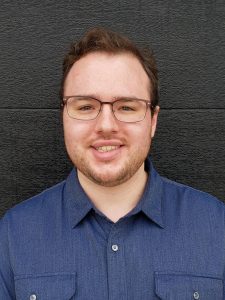WHAT IS YOUR BACKGROUND EDUCATION AND WORK EXPERIENCE?
I graduated from the University of Iowa in 2017 with a Bachelor of Arts in History and two minors in Informatics and Museum Studies. As an undergraduate, I had several student jobs related to the LIS field, including an Exhibit Preparation Assistant, a Digital Library Aide, and I worked in the university’s Special Collections Department. Across those positions, my work included assisting patrons at the service desk, updating metadata for the library’s catalog and finding aids, and contributed to the development of workflows related to the digital preservation of collections. I’ve also had several internships with various federal agencies, including the National Archives and Records Administration, Library of Congress, and Department of Transportation.
WHAT LED YOU TO YOUR FIELD?
As a History major, I’ve always been interested in the maintenance and organization of archives, libraries, and other information repositories. During my sophomore year, I developed my own research project with the University of Iowa Archives in which I examined the archive’s LGBTQ+ special collections. From this investigation, I learned about the different skills and tools it takes to build, maintain, preserve, and digitize archival collections. Over the next few years, I worked with the University Archivist to collect more records for the archives, establish relationships with LGBTQ+ student organizations, and increase community engagement with the collections. By the time I graduated, I knew I wanted to have a career in the LIS field and work in a profession that, at its best, emphasizes accessibility, collaboration, and innovation.
WHAT ARE YOUR RESEARCH INTERESTS?
My research interests are pretty broad. Right now, I am writing a first-year graduate paper about the development of LGBTQ+ community archives in the United States. While I anticipate this project to mainly revolve around community engagement and collection development policies, a large portion of the paper is dedicated to challenges in cataloging, metadata creation, and digital accessibility. As I delve further into my studies, these are all areas that I hope to do more research in. Additionally, I have a strong interest in the digital humanities field. Digital humanities is a fairly broad category, but I think the more work LIS professionals do to bridge the gap between technology, digital preservation, digital publication, and the humanities, the more accessible and interdisciplinary research becomes.
WHAT ARE SOME OF YOUR FAVORITE UNDERUTILIZED SCHOLARLY COMMONS RESOURCES THAT YOU WOULD RECOMMEND?
I think our Library Guides are a great tool for patrons who are unfamiliar with the Scholarly Commons and want to learn more about what we do. Our resource guides talk about everything from digital humanities to geocoding to how to make a research poster, to how to manage your scholarly presence online. If you’re a student or scholar doing research in the digital age, our LibGuides are a great entry point for several important tools.
WHEN YOU GRADUATE, WHAT WOULD YOUR IDEAL JOB POSITION LOOK LIKE?
When I graduate, I hope to have a career in federal librarianship. Information accessibility and community engagement are the cornerstones of the LIS profession. To me, being able to promote those ideals at the federal level means connecting citizens with invaluable information about how the government operates and how narratives within our national history are formed. Federal information repositories comprise some of the world’s most comprehensive records of human creativity and knowledge. By connecting those records with the general public, and by working with the general public to insert a more diverse range of knowledge and experiences into the collections, it makes our histories richer, more complex, and more interesting to study and preserve.


